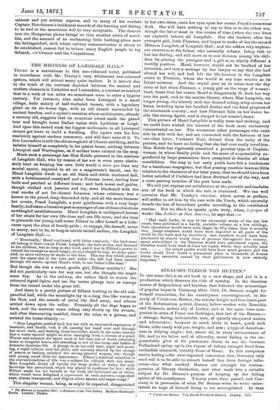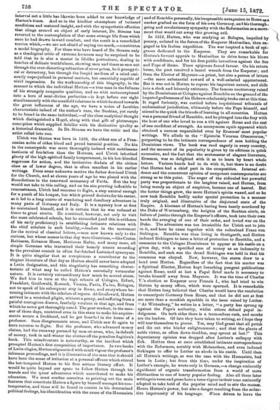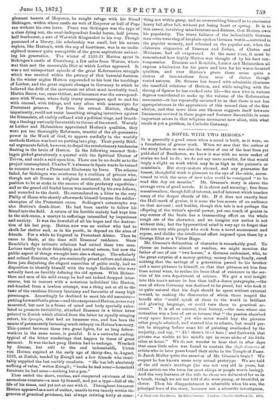STRAUSS'S ULRICH VON HUTTEN.*
Ix one sense this is an old book in a new shape, and yet it is a production which deserves the title of novelty. In the cheerless season of despondency and reaction that followed the miscarriage of popular hopes in Germany after 1848, Dr. Strauss sought for himself consolation, for his countrymen encouragement, in the study of Ulrich von Hutton, the scholar-knight and free-lance poet of the Reformation period, literary fellow-worker with Reuchlin and Erasmus, ardent ally of Luther, and at the same time com- panion-in-arms of Franz von Sickingen, that last of the Barons,— a strange, daring, indomitable man, of queerly chequered nature and adventures; buoyant in mind, stout in heart, quick with blows, alike ready with pen, tongue, and arm ; a type of dauntless- ness in defying might ; but, above all, in every circumstance of life, and to the bitter end of adversity, never failing in the un- quenchable glow of his passionate desire to see the German) Fatherland spring up in the vigour of inborn strength freed from outlandish trammels, notably those of Rome. In this outspoken native feeling—the ever-repeated conviction that Germany only need will it to be able to wrench herself free from foreign influ- ences—lies what marked Hutten out amongst his contem- poraries of literary distinction, and what made him a suitable subject for Dr. Strauss's purpose of keeping up the failing spirits of his countrymen. Twenty years have passed, and Ger- many is in possession of what Dr. Strauss when he wrote enter- tained no hope of himself living to see accomplished. In that
• Ulrich con Mitten. Von David Friedrich Strauss. Leipzig. 1571.
interval not a little has likewise been added to our knowledge of and of Reuchlin personally, his irrepressible antagonism to Rome Jte a flatten's times. Aud so in the kindlier atmosphere of bettered canker grafted on the form of his own Germany, and his thorough- conditions and matured insight, and with the sympathetic affection going and revolutionary sympathy with the Reformation as a move- - that clings around an object of early interest, Dr. Strauss has ment that would cat away this growing evil.
reverted to the contemplation of that same strange life from which In 1512, flatten, who was studying at Bologna, impelled by once he had drawn inward comfort, and the result is a remodelled penury, enlisted in the forces of the Emperor Maximilian, then en- version which,—we are not afraid of saying too much,—constitutes gaged in his Italian expedition. The war inspired a book of epi- a model biography. For those who have heard of Dr. Strains only grams dedicated to the Emperor. They are remarkable for as a theological critic of extreme keenness may be surprised to be Hutten's fervent appeals to Maximilian to drive home his blows told that he is also a master in lifelike portraiture, dealing in with con fideuce, and for his first public iuvectives against the See touches of delicate truthfulness, showing men and times as seen not and Pope of Rome. These epigrams found favour. On his return through the ever-distorting refraction of some prism, be it panegyri- home, the poet received a laurel wreath from the Emperor ; and cal or detractory, but through the limpid medium of a mind emi- from the Elector of Mayence —a priest, but also a patron of letters nently unprejudiced in personal matters, but essentially capable of —the more substantial reward of a well-salaried appointment. vivid impression. In the workmanship of this biography, in the But it was not in Hutton to repress his impatient nature, and slide manner in which the individual Hutten —a true man in the fullness into a sleek and leisurely existence. The famous controversy raised of his strangely composite qualities, and no whit metamorphosed by the Dominicans at Cologne against Reuchlin on the ground of the into a hero of semi-divine perfection—is kept before our sight imputed godlessness of his Hebrew scholarship broke out at this time. simultaneously with the manifold relations in which he stood towards It raged furiously, was carried before inquisitional tribunals of the great influences of the age, we have a union of faculties ecclesiastical jurisdiction, ultimately before the Pope himself, and characteristic indeed of the author's race, the Suabian, yet rarely stirred to the quick the friends of learning in all countries. Rabat to be found in the same individual,—of the close analytical thought was a personal friend of Reuchlin, and he plunged into the fray with which distinguished a Hegel, along with that gift of picturesque the heat of one who loved to run a tilt against Rome and the zest conception which supplied Schiller with his distinctive quality as of one confident of strength. An anonymous squib appeared which a historical dramatist. In Dr. Strauss we have the critic and the obtained a success unparalleled even by Erasmus' most popular interval not a little has likewise been added to our knowledge of and of Reuchlin personally, his irrepressible antagonism to Rome Jte a flatten's times. Aud so in the kindlier atmosphere of bettered canker grafted on the form of his own Germany, and his thorough- conditions and matured insight, and with the sympathetic affection going and revolutionary sympathy with the Reformation as a move- - that clings around an object of early interest, Dr. Strauss has ment that would cat away this growing evil.
came to Basle, at the time still Erasmus' residence. Since Reuchlin's days intimate relations had united these two men. Letters testify to their friendship and mutual esteem, but now the public aspect of things wrought here also a change. The scholarly and refined Erasmus, who pre-eminently prized culture and shrank from jars disturbing the elegant amenities of polite study, had no disposition to identify himself with the rough Radicals who were actually bent on forcibly defacing the old system. With Melanc- thou and men of his mild stamp he had not indeed dropped inter- course, but to consort with a notorious individual like Hatter', red-handed from a lawless attempt, was a thing not at all to the taste of the cautious literary luminary and favourite of many high personages. Accordingly he declined to meet his old associate— putting for ward futil e pleas—and the exasperated Hutten, never very measured, but now in a frame of mind and body specially calcu- lated to promote irritability, attacked Erasmus in a bitter letter printed in Zurich which elicited from the latter an equally stinging retort, his Spongia, that had an immense run, and has been the means of permanently fastening much obloquy on Hutten's memory. This quarrel between these two great lights, for so long fellow- workers in the same cause, is painful. It is a sorrowful ending, typical of the bitter sunderings that happen in times of great moment. It was the last pang Hutten had to undergo.. Wracked by disease, but still to the end indomitable, Ulrich von Hutten expired at the early age of thirty-five, in August, 1523, at Zurich, tended by Zuingli and a few friends who chari- tably supplied the last earthly comforts. "He has left absolutely nothing of value," writes Zuingli ; "books he had none—household furniture he had none—nothing but a pen."
Thus ended the short, restless, and chequered existence of this anomalous creature—a man by himself, and yet a type—full of the life of his times, and yet not at one with it. Throughout his career Hutten appeared as a sort of outlaw, unable to run tamely within the grooves of practical prudence, but always striving hotly at some- thing not within grasp, and so overreaching himself as to encounter heavy fall after fall, without yet losing heart or spring. It is to this career, iuvolving misadventure and distress, that Hutten owes his popularity. The brave failures of the indomitable German man—the terse ring of his plain-spoken German words—survived in the popular memory, and vibrated on the popular ear, when the elaborate elegancies of Erasmus and Eoban, of Crotus and Mutianus, had all evaporated. At the same time, it must be remembered how highly Hutten was thought of by his best con- temporaries. Erasmus and Renchlin, Luther and Melancthon all express admiration for his parts and love for his warm-hearted qualities, and over Hutten's grave there arose quite a chorus of lamentations from men of choice though varied natures. Dr. Strauss has traced with admirable clearness the manifold relations of Hutten, and while mingling with the throng of figures he has evoked into life—the men who in various degrees contributed to make up the volume of the Reformation movement—it has repeatedly occurred to us that there is not less appropriateness in the appearance of this second than of the first edition, and that more than one likeness suggests itself between lineaments revived in these pages and features discernible in some important actors in that religious movement now afoot, with what result is yet a problem, in Catholic Germany.




































 Previous page
Previous page